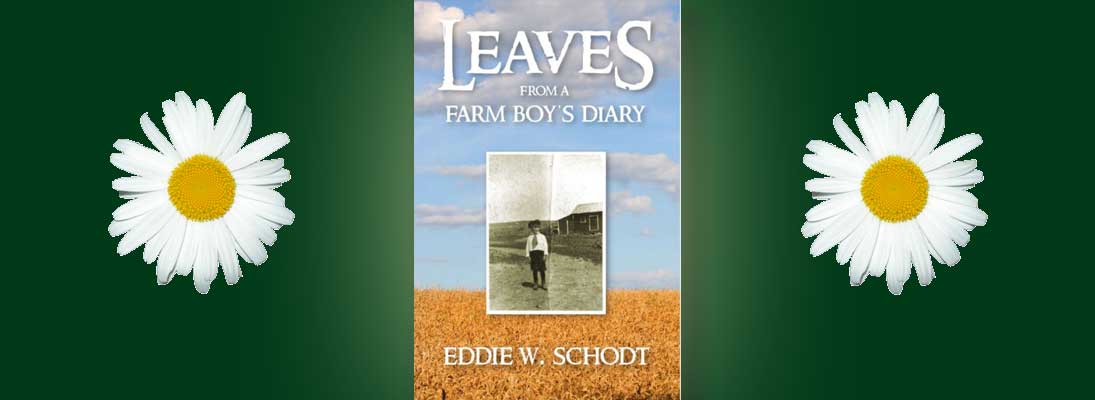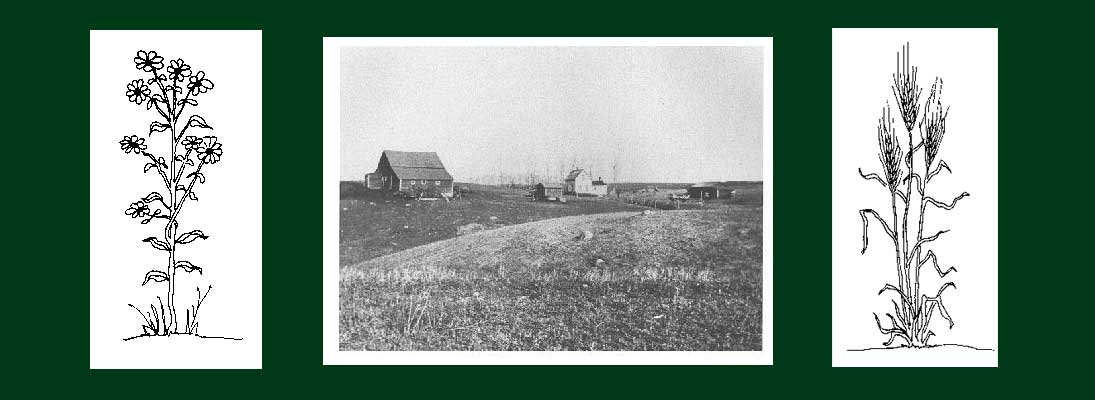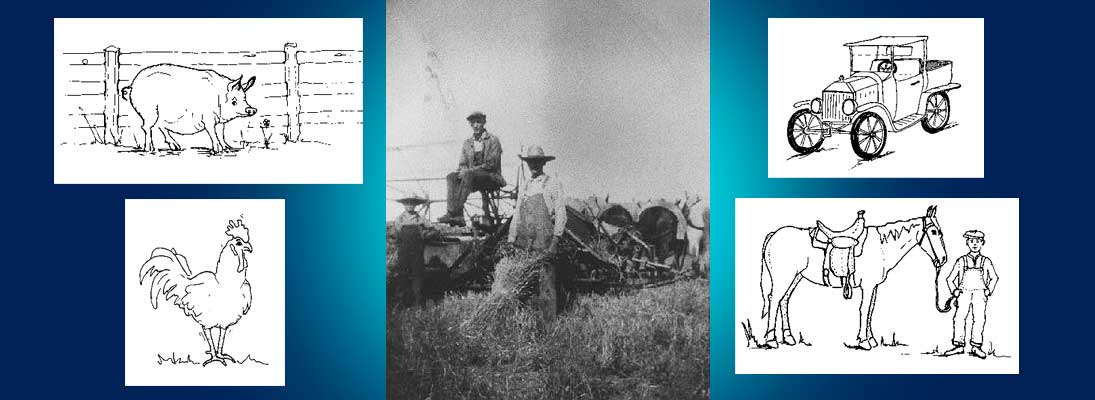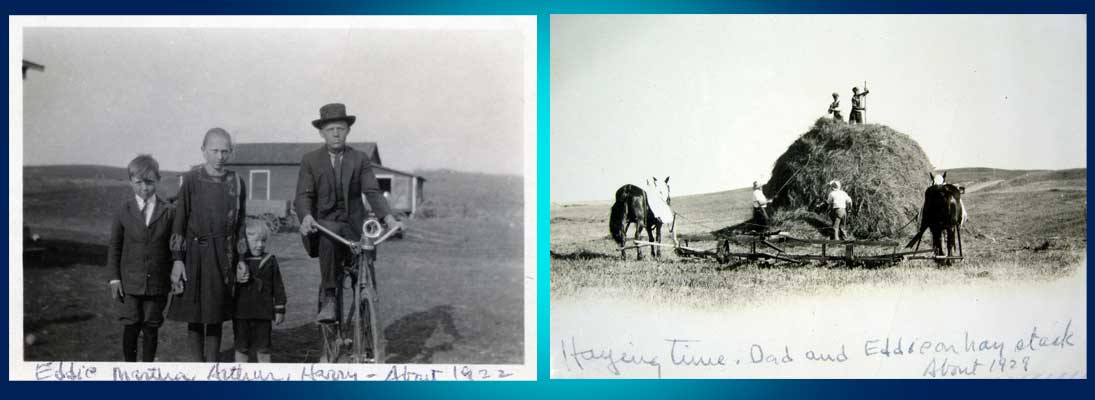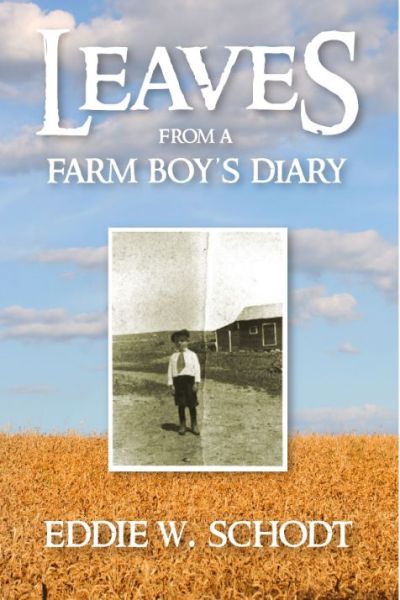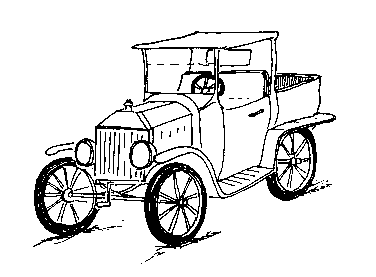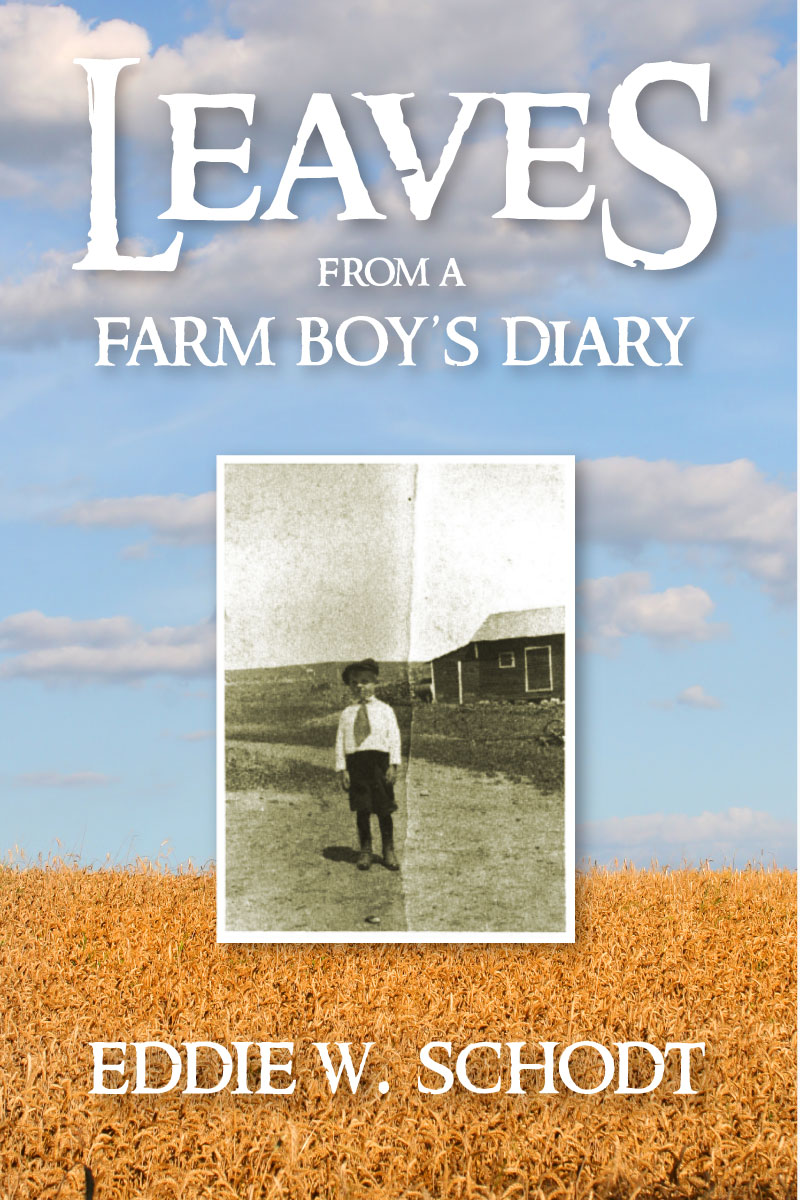Story
This book is by my father, Eddie W. Schodt. It is a delightful series of stories about growing up on a remote North Dakota farm early in the twentieth century, and it was written with young people in mind. The casebound edition of the book is out of print, but thanks to modern technology it is now available on Amazon and other platforms as an e-book, with a new cover and additional biographical information on Eddie, for your reading pleasure. It comes with photos from his youth, and illustrations by me, Fred, his son.
Eddie was born in 1914 and lived a long and fascinating life until 2008, when he departed this world at the age of 93. He came a long way from very humble beginnings, the first in his family to go to college, eventually going on to obtain a Phd in history. After serving in the U.S. Army in World War II, he also joined the Foreign Service, living and working overseas for nearly twenty years. He lived in Norway, Australia, Japan, Thailand and, as a teacher after retiring, in England and France. You can read about his Foreign Service career HERE.
Here's a section from the first page of Eddie's book, which gives you an idea of the setting, and the very different era in which Eddie lived. He was the seventh of eight children in an immigrant family from Denmak, the first to be born in the United States after what must have been a grueling trip by ship from the "old country," as his family called it, and then a long train ride across much of Canada to get to North Dakota, where they settled outside of the tiny town of Luverne in 1912. Eddie spoke mainly Danish at home, and English at school. Because of poverty, and the remoteness of the area in which his family lived, in many ways the life he describes more resembles that of something we might imagine from the late 19th century, rather than the early 20th century. Which makes his book all the more interesting. A note to younger readers: the word "leaves" in the title of the book is supposed to be a bit of a double-entendre, or pun, since "leaves" can mean "leaves" as in tree or tea "leaves," but also (especially in my father's mind) pages from a book.
The sun came up over our granary and went down over our barn. Both the granary and the barn were painted red with white trim, and between them stood our all-white, two story, square house. It had one lean-to for a kitchen and another for an entrance porch, and sat in a slight depression between the barn and granary, facing south. Just north of the house there was a small grove of trees that provided shade in the summer— and places for birds to build their nests and for children to swing and climb.
When I arrived there were already six other children in the family. We all shared two bedrooms on the second floor; my parents had the one on the first. There was no running water, electricity, or telephone. The toilet was back of the house, and it was painted red. We called it a "two-holer," because it had seats for two people. Montgomery Ward and Sears Roebuck catalogs provided the toilet paper, free of charge.
I was born at night in the winter of l9l4, and my father had to walk a mile to the nearest town to get a doctor. On the way back he passed a house in the town and he noticed through the window that a stove inside was giving off an orange-red color. Later that same night the stove apparently over-heated and caused a fire that destroyed the house. A small boy sleeping inside burned to death.
I was not named after this boy, but after an older cousin in the western part of North Dakota. He had died shortly before as a result of an accident. His head was crushed under the wheels of a wagon he was driving when he was hauling water from a neighbor's well to his home.
As with all of my brothers and sisters, I was given certain responsibilities from an early age. I had to bring in wood and coal for the stove, and water for the kitchen, and in the winter I had to bring snow to be melted in a steel barrel by the kitchen stove so we could make soft water for washing clothes and people. But that wasn't all. I also had to help with the milking, churn the butter, pick the eggs, help clean the barn and— after our motor-driven washing machine broke down and we didn't have enough money for another one— I had to help my mother do the washing every Monday with its hand-powered replacement. Mother insisted on twenty minutes for each load, and would not accept one minute less.In spite of all the work, there was still time to play as well as to hunt and fish, especially in the summer and on winter days when I was not in school. And there was always at least one dog who was my constant companion. But perhaps the best time of all came every two years or so when my older brothers and sisters returned from far away California to visit. Then every day seemed like a holiday, with good food, less hard work, and much merriment in the evenings around our kitchen table or in our living room.
--Back to top--
Cover
Leaves from a Farm Boy's Diary.
by Eddie W. Schodt.
The E-book design, including the cover, is by the ever-amazing Raymond Larrett. I love the way it uses a background of fields and blue sky. The photo in the center is of Eddie, when he was probably about four years old. Exactly when it was taken is not 100% certain, but it shows him standing in front of what was one of the buildings on the North Dakota farm. He was born in 1914, so this would probably make the photo from around 1918, the same year that World War I ended.
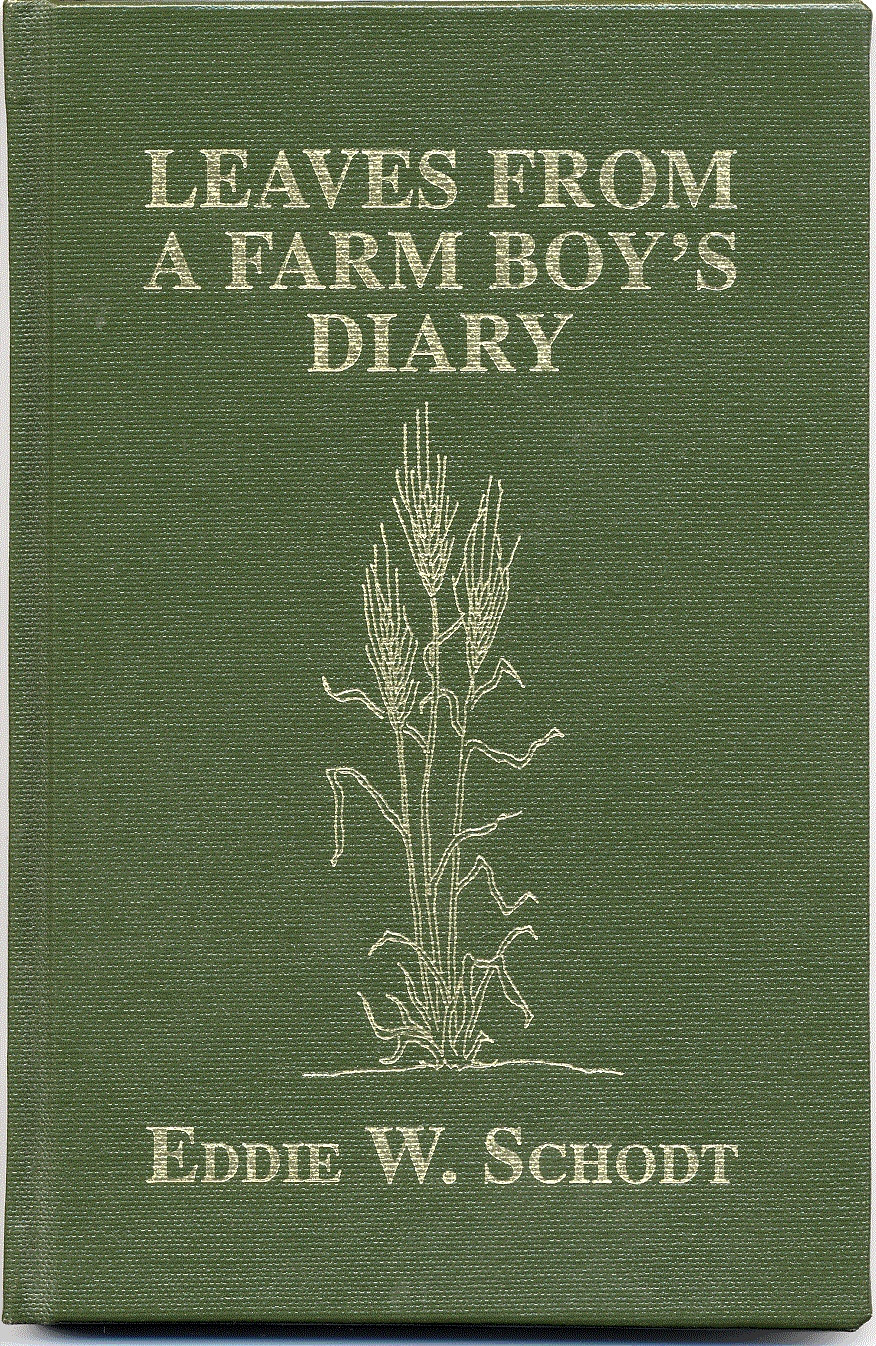 The ebook was issued in 2014, and it was adapted from the original hardback edition that was published by Professional Press of Chapel Hill, North Carolina, in 1994. In those days it would have been much more expensive to use a color cover, so by today's standards I have to confess that the hardcover looks a little drab!
The ebook was issued in 2014, and it was adapted from the original hardback edition that was published by Professional Press of Chapel Hill, North Carolina, in 1994. In those days it would have been much more expensive to use a color cover, so by today's standards I have to confess that the hardcover looks a little drab!
A Danish translation of the English book was also done in Denmark around 2016. The lovely cover photo is an enlarged version of the same one one used on the e-book cover. It's one of my favorites. It shows Eddie on the North Dakota farm in Luverne, standing in front of the granary with the garage at the end. He's wearing button shoes, it's about 1919 and, since Eddie was born in 1914, in this photo he's probably about five years old. It is the oldest picture of Eddie that we have.  It was kindly translated over several years in Denmark, especially during the long dark winter hours, by relative Hans Peter Christensen, assisted by Christian Scholz. Hans Peter's son Ole Comol Christensen also helped them find a publisher in Denmark, and Heidi Scholz helped with scanning. Surviving family members in the United States can't thank them enough!
It was kindly translated over several years in Denmark, especially during the long dark winter hours, by relative Hans Peter Christensen, assisted by Christian Scholz. Hans Peter's son Ole Comol Christensen also helped them find a publisher in Denmark, and Heidi Scholz helped with scanning. Surviving family members in the United States can't thank them enough!
--Back to top--
Praise
Comments from Reviewers:
Several reviews have appeared on Amazon, so that may be the best place to look. It's not a book supported by marketing or a big publisher, so it's best just to rely on people who have read it. People who read it with the wrong expectations, thinking that it is targeted at adults, or a thriller-adventure work, may be disappointed. The people who love it the most seem to be those with children, and people who have grown up in North Dakota or know something about the era and the state. Today, North Dakota is definitely not the place that Eddie describes! If you do read it and like it, please leave a review on Amazon or GoodReads.
Ebook: 107 pages with drawings and photographs.
Publisher: JAI (February 21, 2014)
Language: English
ASIN: (E-Book) B00ILCA56I
Cover & Ebook Design: Raymond Larrett
Table of Contents
Table of ContentsI. INTRODUCTIONII. BOYHOOD
III. HUNTING AND FISHING
|
